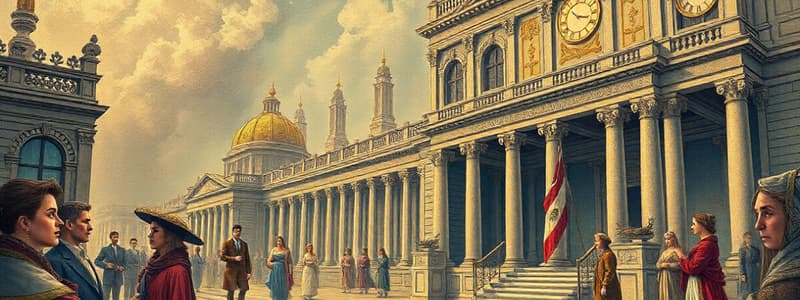Podcast
Questions and Answers
What criticism is levied against political parties regarding voter representation?
What criticism is levied against political parties regarding voter representation?
- They often require voters to align with a manifesto that may not fully represent their views. (correct)
- They facilitate a higher degree of voter choice.
- They encourage MPs to prioritize personal mandates over party lines.
- They always cover the full spectrum of political views.
What is a key characteristic of adversary politics as illustrated in the content?
What is a key characteristic of adversary politics as illustrated in the content?
- Effective negotiation leading to lasting coalitions.
- Heightened polarization and confrontational tactics. (correct)
- A lack of focus on differences to achieve coherent governance.
- Collaboration and mutual respect between parties.
Which historical example demonstrates the potential success of consensus politics?
Which historical example demonstrates the potential success of consensus politics?
- The Labour Party's manifesto in the 2017 election.
- The rise of independent candidates in recent elections.
- The Conservative-Liberal Democrat coalition that lasted a full parliamentary term. (correct)
- The conflict between the Democrats and Republicans in the USA.
How do political parties function in the development of policies?
How do political parties function in the development of policies?
What issue arises from the necessity for MPs to support their party's agenda?
What issue arises from the necessity for MPs to support their party's agenda?
What characterizes consensus politics?
What characterizes consensus politics?
Which historical figure is associated with the concept of 'Butskellism'?
Which historical figure is associated with the concept of 'Butskellism'?
What period is characterized by adversary politics?
What period is characterized by adversary politics?
What does the term 'mandate' refer to in politics?
What does the term 'mandate' refer to in politics?
Which function of a political party involves choosing candidates for elections?
Which function of a political party involves choosing candidates for elections?
What event exemplified strong opposition to Conservative policies in the 1980s?
What event exemplified strong opposition to Conservative policies in the 1980s?
What happened to Labour MP Sam Tarry in 2022?
What happened to Labour MP Sam Tarry in 2022?
How do political parties contribute personnel to government?
How do political parties contribute personnel to government?
What characterizes consensus politics?
What characterizes consensus politics?
Which decade is noted for consensus politics in the UK?
Which decade is noted for consensus politics in the UK?
What is an example of adversary politics?
What is an example of adversary politics?
What event typified the adversarial nature of politics in the 1980s?
What event typified the adversarial nature of politics in the 1980s?
What is meant by the term 'mandate' in politics?
What is meant by the term 'mandate' in politics?
During which time period did Butskellism emerge?
During which time period did Butskellism emerge?
Which of the following best describes the dynamics of adversary politics?
Which of the following best describes the dynamics of adversary politics?
What were the general views of the main parties during consensus politics in the 1950s?
What were the general views of the main parties during consensus politics in the 1950s?
Flashcards are hidden until you start studying
Study Notes
Political Parties: Features and Functions
- Political parties provide a platform for candidates to contest elections
- The selection process for candidates involves a national selection process followed by constituency party endorsement
- Elected politicians represent the views of their constituency in the House of Commons
- Parties play a significant role in forming government and providing its personnel
- The 2010 coalition government was formed of Conservatives and Liberal Democrats
- Parties contribute to the cohesiveness and stability of government by uniting politicians with shared ideologies
- Parties develop and present coherent political programs through discussions
- The "spirit of faction" can lead to a confrontational approach to government and create a polarised society
- The US political system exemplifies how negative party animosity can lead to government deadlock, with instances of government shutdowns
- The Conservative-Liberal Democrat coalition in the UK demonstrates the potential for productive cooperation between parties when differences are minimized
Consensus vs. Adversary Politics
- Consensus politics occurs when the two main parties have similar values and agree on most policy positions.
- Adversary politics occurs when the two main parties have contrasting values, often leading to a situation where the opposition routinely opposes government policies.
- The 1950s in the UK were characterised by consensus politics as Hugh Gaitskell (Labour) and R.A. Butler (Conservative) shared similar views on economic and social issues, a phenomenon known as "Butskellism".
- The early 1980s in the UK witnessed adversary politics, marked by the clash between the socialism of Michael Foot (Labour) and the free-market reforms of Margaret Thatcher (Conservative).
- The miners' strike of 1984-85 exemplifies the period of strong opposition to Conservative policies.
- The term mandate refers to the legitimate right a political party gains after winning a general election to implement its manifesto promises
Limitations of Political Parties
- Political parties can limit voter choice by requiring individuals to align themselves with a party's manifesto, which may only partially represent their political views.
- The freedom of action of MPs can be curtailed by party whips, as they expect MPs to support their party's agenda, often prioritizing party loyalty over personal convictions.
- Political parties can be criticized for stifling genuine debate in a representative democracy by monopolizing political decision-making.
Studying That Suits You
Use AI to generate personalized quizzes and flashcards to suit your learning preferences.




